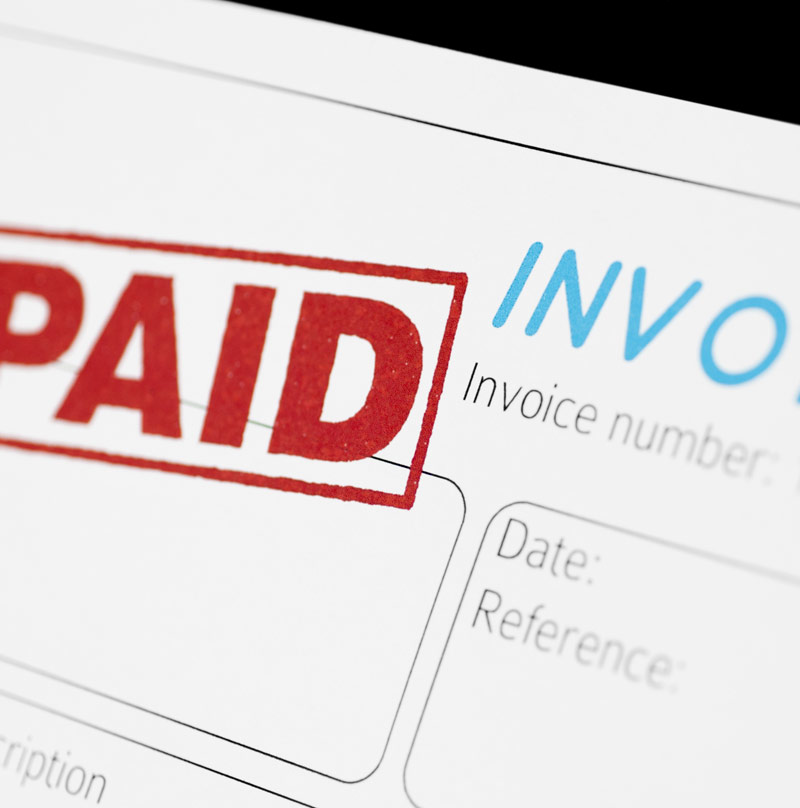What is Factoring?
Factoring is a process where the company raises money by selling its customer invoices to a funder or bank. For example, if you are a printing business and you raise invoices to companies for their general commercial printing needs, then these invoices can be sold and funded by a factoring company.
The lender will look at the invoices, the customer base and your business and decide how much to lend to your company or business – based on the quality of their risk.
Usually, if you have a business issuing regular invoices to other businesses, you will find that they can lend you up to 90% of the value of those invoices. Typically though, 75% to 80% is the norm.
Once your company signs up for a facility like this it has to disclose to its customers that it has sold (assigned) its debts to the factoring company. So, your customers will now know the debt has been purchased by a factoring company AND they have to pay to a different bank account.
The factoring company will set up the new bank account in your company’s name to collect customer payments. This account will not be under your company’s control, but it acts as a receptacle to “catch” payments.
Then, the factoring company will allow you to “draw down” those funds when cleared. Each week or month, the factor will calculate how much your company has borrowed and charge according to the contract you agreed when setting up the facility.
So, issuing daily, weekly or regular invoices is beneficial to cashflow as you can borrow money pretty much straight away against that invoice.

Advantages of factoring
- If you were to issue an invoice for £2,000 plus VAT (£2400) you could then sell this invoice to a factoring company. It would sell for 75% of the value, which is £1800. You can draw this money down the DAY YOUR INVOICE is passed to the factor. This is great for cashflow – Especially if your customer normally takes 75 days to pay!
- When your customer pays the bill, the money will be received into the special bank account set up by the factoring company. Typically the other 25% that is outstanding is then paid to you upon receipt. Less any charges and interest.
- This can be a very efficient way of raising money. However, it normally requires the company to sell all of company’s invoices to the factor.
- Some funders may buy single invoices if they’re quite large.
- The factoring company will often offer a service to collect the debtor payments. (Your customer’s payments to your company). If you are a busy small business then this can be a good service. It will generally ensure that the company receives payment within the normal time frame.
- It is relatively inexpensive.
- Money is in your bank quickly. You do not have to wait weeks for bank managers to provide overdrafts.
- It is very quick and straightforward to set up. As long as you have reasonable accounting information that is.
Disadvantages of factoring
- If your company only has one or two customers then factoring can be difficult to arrange because of what is called concentration issues. Too much concentration on one customer can mean that the factoring company cannot get adequate insurance cover. Alternatively, its own credit risk is too high.
- It costs. Charges vary according to your businesses, customers and the size of the invoices etc. If your company has a good credit rating, costs may be less.
- Directors or partners will have to provide ongoing financial information on a regular basis to the factoring company.
- You may need to provide a personal guarantee or indemnity to the lender.
- If your customers pay later than 85 days it may not be a good product for your company
Is Factoring Right For My Company
Factoring is an excellent product for businesses that produce goods or services and issue regular invoices to their customers. It can help the company grow, it is relatively inexpensive and the risk is relatively low.
You may be required to provide an indemnity or personal guarantee to the factoring company, this means that you will adhere to the rules and not issue false invoices for example.
COMPANY FUNDING OPTIONS can introduce you to a large number of factoring companies in the UK and abroad. There are over 40 companies in the market and competition is fierce. Therefore you can usually shop around.
Factoring is not suitable for property development companies and it isn’t that easy to obtain for construction sector, but new products are being introduced all the time. Please call us if you wish to discuss funding your construction company.
